If you’ve ever tried embroidering on towel fabric, you know it’s not as simple as it seems. Embroidering on towel material requires a few special techniques to keep designs crisp and visible.
From stabilizing the fabric to choosing the right thread, each step matters in getting professional results. In this guide, you’ll find easy, expert tips to make your towel embroidery look flawless, even if it’s your first attempt. Let’s explore how to bring your towel designs to life!
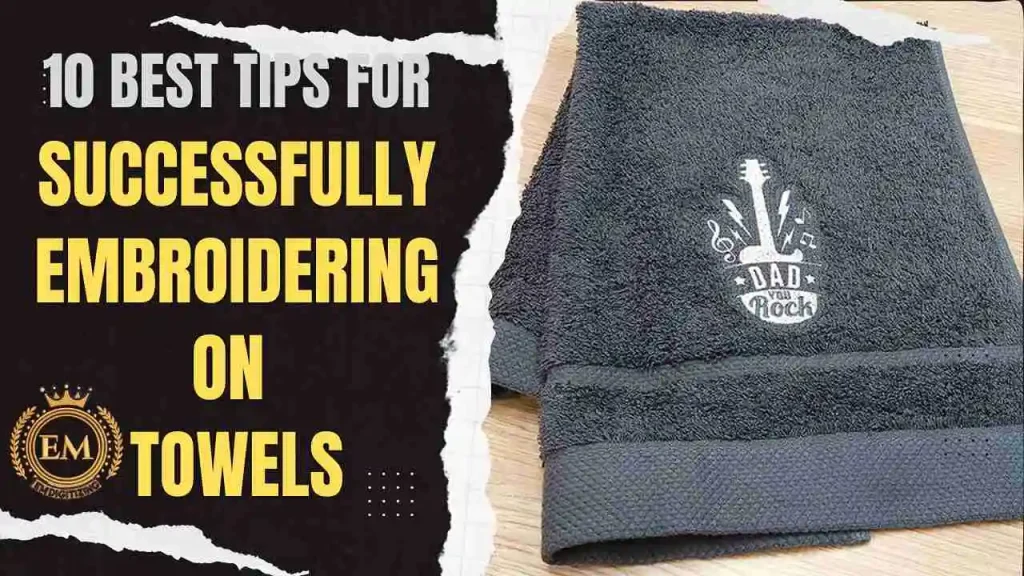
10 Best Tips for Successfully Embroidering on Towels
Embroidering on Towels | Top Tips
It can be challenging due to the thickness and texture of the fabric. Here are some essential tips to ensure your designs look professional and vibrant.
- Wash Your Towel First
- Use a Laydown Stitch or Stabilizer
- Choose the Right Needle Size
- Remove Stabilizer Carefully
- Keep the Design Neat
- Learn to “Float” the Towel While Embroidering
- Use Spray Adhesive to Keep the Towel Steady
- Use a Template
- Pick Bold Stitch Patterns for Better Results
- Focus on Durability
1. Wash Your Towel First
Pre-washing your towel is crucial for a smooth embroidery process. It removes any potential shrinkage, lint, or residue that might interfere with the design. Washing also softens the fabric, making it easier for the needle to glide through and helping the embroidery designs for towels to settle nicely on the fabric.
2. Use a Laydown Stitch or Stabilizer
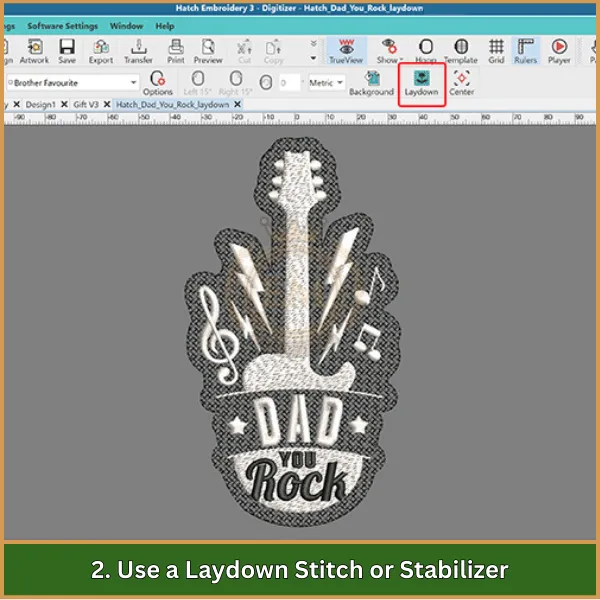
Towels often have a thick, plush pile that can interfere with embroidery, making designs appear sunken. A laydown stitch or stabilizer helps flatten this pile, giving your design a clean, elevated look. This added layer keeps the stitches from sinking into the towel fibers and ensures your design looks polished.
3. Choose the Right Needle Size
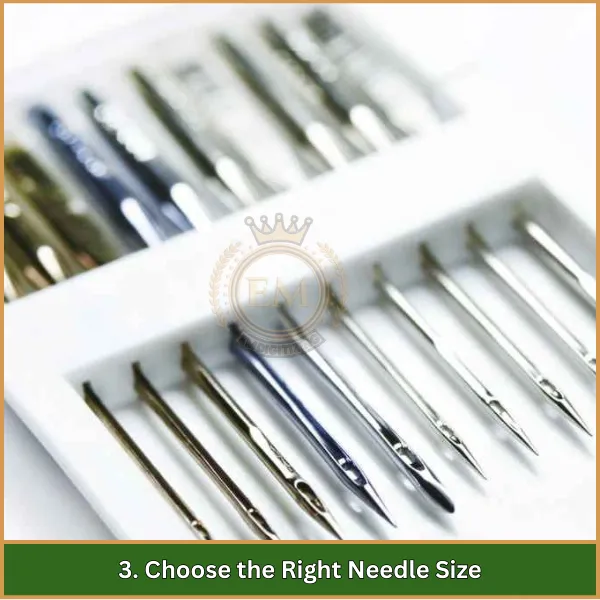
Using the correct needle size is essential when machine embroider on a towel. A medium to large embroidery needle can handle thicker towel material without breaking or pulling threads. This choice reduces the risk of fabric damage and ensures the stitches are smooth, clean, and durable.
4. Remove Stabilizer Carefully
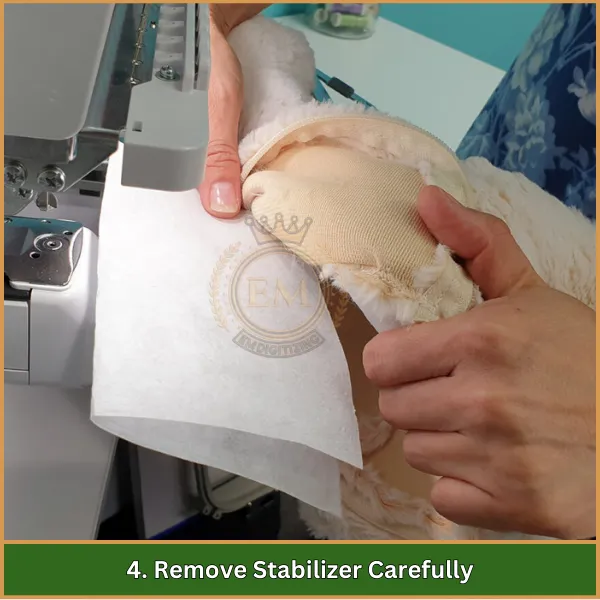
Tear-away stabilizer is ideal for embroidering on towels because it provides support but is easy to remove afterward. This keeps the design looking neat without leaving residue. Choose a stabilizer that’s gentle on the towel fibers and can be removed without tugging or distorting the stitches.
5. Keep the Design Neat
Water-soluble topping prevents the towel’s texture from overpowering the design. It acts as a protective layer, keeping stitches above the towel pile so they don’t sink in. Once you’re done, simply rinse it away with water to reveal a crisp, well-defined design on the towel.
6. Learn to “Float” the Towel While Embroidering
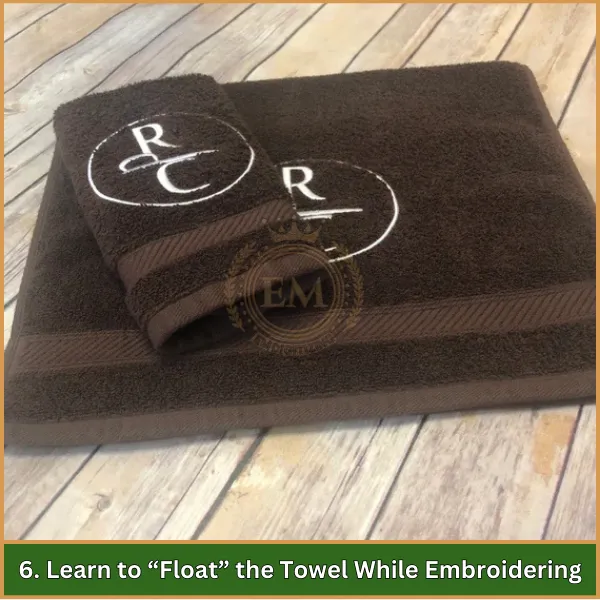
Floating involves attaching the towel to the stabilizer instead of tightly hooping it, which reduces stress on thick towel fabric. This technique prevents distortion, allowing your design to stay intact. Floating is especially useful for dense fabrics, as it minimizes stretching and gives a cleaner finish.
7. Use Spray Adhesive to Keep the Towel Steady

Spray adhesives help hold the towel firmly in place while embroidering, preventing it from shifting. Unlike pins or clips, spray adhesive won’t leave marks on the towel fibers, which is especially helpful for thick or textured towels. It ensures your design is positioned accurately and stays steady during stitching.
8. Use a Template
Using a design template is essential when learning how to embroider on towels as it helps with accurate alignment. It prevents mistakes in positioning, ensuring your design appears centered and balanced on the towel surface. Templates are easy to mark and remove, making them a helpful guide for achieving a professional look.
9. Pick Bold Stitch Patterns for Better Results
Bold, dense stitching patterns stand out better on towels, as thin or delicate designs may get lost in the thick fabric pile. Choose designs with a substantial stitch weight that won’t easily blend into the towel fibers. This approach ensures your design looks vivid and professional.
10. Focus on Durability
For towels, durability matters. Choosing the best towels to embroider on includes finding high-quality, low-pile towels that can hold up well under frequent washing. Using strong polyester thread and opting for simpler, sturdy designs over intricate patterns keeps the embroidery looking fresh and vibrant after multiple washes.
Bottom Line
With the right tips, embroidering on towels becomes a smooth and enjoyable process, bringing out the best in your designs. For those looking to achieve high-quality, professional results, EMDigitizing is here to support you!
We offer affordable digitizing services with a quick turnaround time and guaranteed quality. You’ll even get a preview of your design before it’s finalized, ensuring everything is just right. And if you’re new to us, you can take advantage of an amazing 50% discount on your first order.
Let EMDigitizing help bring your embroidery vision to life!
FAQs
The cost for embroidering a name on a towel generally falls between $5 and $15. This can vary based on factors like the design complexity and the rates set by the embroidery service provider.
To machine embroider on flour sack towels, start by stabilizing the fabric with either a tear-away or cut-away stabilizer. Use a sharp needle and select simple, open designs to prevent puckering and maintain a smooth finish.
When embroidering on towels, boost the stitch density by around 10-20%. This adjustment helps the design stand out against the towel’s plush fabric without disappearing into the loops.
To embroider a monogram on towels, hoop the towel with a water-soluble topper, add a stabilizer for support, choose a bold font, and stitch slowly. This approach ensures clear, high-quality results for your monogram design.
